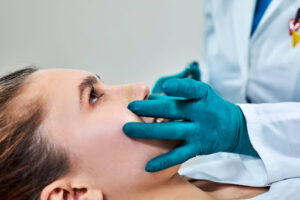A facelift is an effective way to restore a person’s youthful appearance. In this article, we discuss how long it takes to fully recover from a facelift and what people should consider when considering whether or not to undergo this type of plastic surgery.
What Is A Facelift?
A facelift is a type of plastic surgery procedure used to reduce the signs of aging in facial skin. Facelifts help people look younger and more refreshed by tightening loose or sagging skin, reducing wrinkles, and improving overall facial contour.
There are different types of facelift surgeries available, ranging from mini facelifts to full-face lifts. The recovery time after a facelift can vary depending on the individual patient’s age and health as well as the type of facelift they have undergone.
A qualified head and neck surgeon practicing in facial plastic surgery will be able to provide advice regarding how long it takes for patients to resume normal activities following their facelift procedure. In some cases, a cosmetic surgeon will recommend that patients take up to six weeks off work and avoid daily activities such as exercise and heavy lifting.
How much is a facelift in Canada?
Benefits Of Facelift Surgery
A facelift procedure is a safe and effective way to achieve a more youthful appearance. Although the recovery process following a facelift can take several weeks, following post-operative instructions carefully drastically reduces the risks of complications and accelerates healing.
The recovery process following a facelift usually involves some swelling, bruising, and discomfort around the treatment area that typically subsides within two weeks or so. In comparison to other facial cosmetic procedures such as rhinoplasty or blepharoplasty, the risk levels are considerably lower with facelifts due to their minimally invasive nature.
Even though the process of fully recovering from a facelift takes some time, steady progress should be made within the few days following the procedure. Most patients are able to see positive results right after some mild swelling present during the initial healing period recedes. With proper care and attention given throughout the healing process, you can enjoy a natural-looking outcome with long-lasting effects!
How Long After A Facelift Will I Look Normal?
In general, a full facelift or neck lift can take from four weeks up to six months for your body and skin to heal properly. The amount of time it takes to recover after a facelift depends largely on individual factors such as age, lifestyle habits, and health conditions.
Most people take about two weeks off work following their facial rejuvenation procedure before resuming normal activities. It’s also important to note that during this period there may be some bruising or swelling which will gradually fade over time. Maintaining healthy eating habits, resting and limiting sun exposure can help accelerate healing. This way, patients can enjoy their new look more quickly without compromising their safety or desired aesthetic outcome.
Risks Of Facelift Surgery
Candidates for facelift surgery should understand the risks involved. Facial surgeries such as a facelift or neck lift can require up to 21 days of recovery time and an additional few months for full healing. Patients may also experience some loose skin during their recovery period that could take longer to heal than expected.
Other facial surgeries, like eyelid surgery and double chin liposuction, are commonly done at the same time as a facelift. However, this can add more risk factors to consider, such as infection and nerve damage. Since blood thinners are often administered before these procedures, a patient’s body must be able to handle these before the cosmetic procedure is performed.
Pre-Surgery Preparation
Before undergoing a facelift, it’s important to speak with a board-certified facial surgeon to discuss your medical history and desired outcome. During your personal consultation, be sure to tell your doctor if you’re considering treating other areas like a double chin or facial contour.
There are certain steps that must be taken prior to the operation day. Your doctor may ask for lab tests or imaging studies before going ahead with the procedure. Additionally, he will give you specific instructions on how best to prepare for surgery. This may include avoiding medications such as aspirin or ibuprofen and what kind of clothing should be worn before and after the surgery.
Post-Surgery Care
Post-surgery care is an essential part of any surgical procedure. To have a successful recovery, it’s important to follow your doctor’s instructions closely during the weeks and months after surgery.
Here are some tips for post-surgery care:
- On the day of surgery, take the prescribed pain medication as instructed by your doctor and rest to reduce discomfort or swelling.
- Avoid physical activities and stick with light activities such as walking for several weeks after surgery.
- Eat soft foods that are easy to digest and avoid sun exposure for several weeks following the facelift procedure.
- After 6 weeks, gradually increase physical activity but avoid strenuous exercise until you receive approval from your doctor.
It’s also beneficial to attend follow-up visits with your surgeon so they can monitor the healing process. During these appointments, they may provide additional advice on how best to manage post-surgery care at home in order to promote faster recovery times and optimal results.
Pain Management During Recovery
It’s likely that you will experience some discomfort in the days and weeks following your surgery. While each person’s recovery period may vary depending on their individual case and the type of facelift procedure performed, there are a few things you can do to help manage pain throughout your facial rejuvenation journey.
Prescription skincare products given by your surgeon should be used as directed for optimal results. Pain relief medication and hot compresses can provide relief from symptoms associated with the recovery process. With careful attention paid to prescribed medications, at-home treatments, and appropriate rest periods, you’ll be able to enjoy all the benefits of a successful facelift without experiencing too much discomfort along the way!
Swelling And Bruising After Surgery
After a facelift procedure, swelling and bruising are common. In the majority of patients, residual swelling may remain for up to one week after surgery. On the day after surgery, some excess skin can appear with a pinkish-red hue. This is normal and generally goes away about a week post-surgery. Swelling occurs when blood vessels become inflamed. It’s essential to get plenty of rest and follow your doctor’s instructions regarding medications to ensure optimal healing results. To minimize any discomfort, you should avoid social activities until all swelling has subsided.
Taking Care Of Incisions
There are several things you can do to ensure your healing process goes smoothly over the months following the surgery. Here’s a list of tips for taking care of incisions:
- Keep the incision area clean and dry: this means regularly cleaning the area with soap and water and keeping it covered when necessary in order to avoid any infection from bacteria.
- Observe your health: pay attention to changes such as swelling, redness, drainage, or fever. These could point toward potential complications.
- Restore skin elasticity: follow the doctor’s orders on how best to get back into good standing and regain lost skin elasticity.
- Consider emotional recovery: facelift surgery can be emotionally draining even if done successfully. Don’t forget about your mental well-being, as it plays an important role in achieving optimal recovery results.
Taking proper precautions and staying committed will go a long way in ensuring a safe and successful recovery!
Diet And Activity Restrictions During Recovery
Facial tissue needs time to heal properly and it’s essential that this process is not interrupted in any way. Following proper diet and activity restrictions is important to ensure good long-term results. Sweet food should be avoided during the recovery period, as it can interfere with the healing progress. It’s also important to avoid direct sunlight or sun damage which could impact the soft tissues negatively.
Light exercise may only begin once there are signs of healing (typically after two weeks post-procedure). It’s always best to follow your surgeon’s advice throughout your entire recovery journey for optimal healing and great long-term results from your facelift procedure. Following these tips will give you one of the best chance at achieving beautiful results that last!
Maintaining Results With Lifestyle Changes
Once your facelift recovery is complete, it’s not the end of the journey. Maintaining results with lifestyle changes ensures long-term anti-aging benefits. Lifestyle changes that should be made before and after surgery include avoiding sun over-exposure, eating healthfully, and staying active physically. While the timelines for each patient depend on their particular circumstances, taking proper measures during recovery can make all the difference.
Book A Facelift Consultation
If you are considering a facelift or want more information on how it may help restore your confidence, make sure to book an appointment with an experienced head and neck surgeon practicing in facial plastic surgery such as Dr. Sami Moubayed who can answer all of your questions about this procedure.
Clinique Face MD offers specialized cosmetic medical and surgical care exclusively for the face and neck in Westmount. Our facilities are equipped with the latest and most modern equipment to care for your face. Our state-of-the art facilities have a luxurious yet cozy feel. We do not accept anything less than one of the best and latest treatments and technologies available to treat your face.





